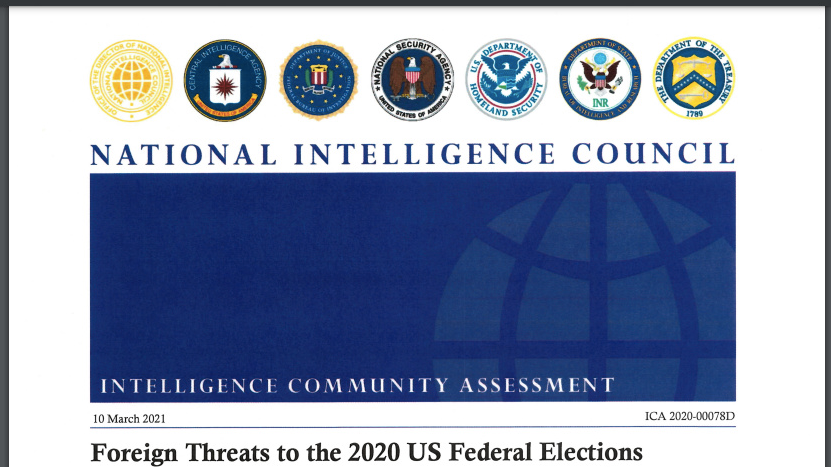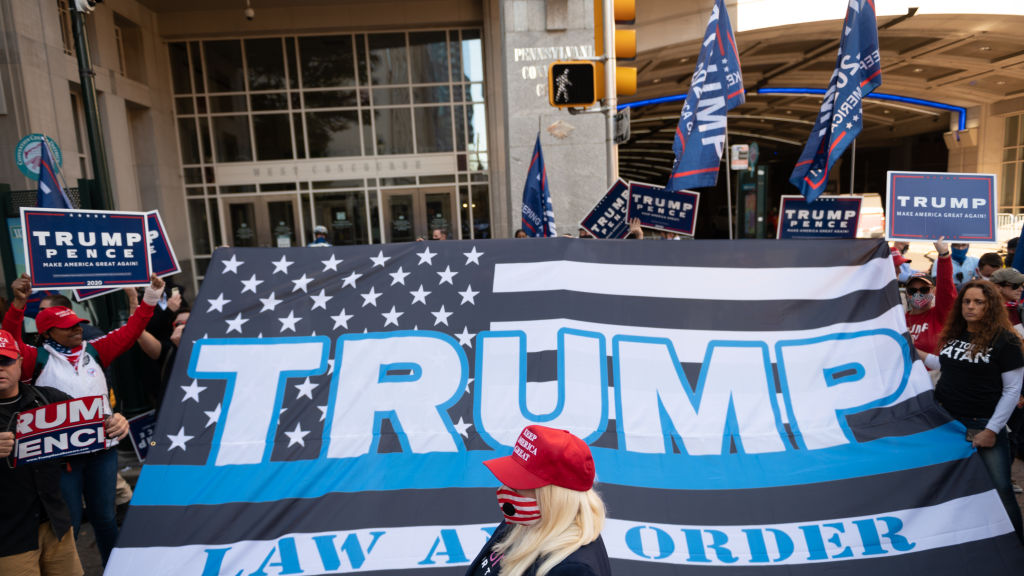
A declassified report of the "Foreign Threats" to the 2020 elections studied by the U.S. National Intelligence Council. /Screenshot via the website of U.S. Office of the Director of National Intelligence
A declassified report of the "Foreign Threats" to the 2020 elections studied by the U.S. National Intelligence Council. /Screenshot via the website of U.S. Office of the Director of National Intelligence
Editor's note: Hamzah Rifaat Hussain is a former visiting fellow at the Stimson Center in Washington and serves as assistant researcher at the Islamabad Policy Research Institute (IPRI) in Pakistan. The article reflects the author's opinions and not necessarily the views of CGTN.
Six months ago, when the former U.S. national security advisor, Robert O' Brien, said that China was seeking to interfere in the 2020 elections, many Americans, including diehard Donald Trump supporters, claimed that Beijing was preparing for an open-ended period of confrontation with the United States for which Trump's hawkish stance on China was completely justified. O'Brien also went a step further by claiming that China played the most active role alongside other states such as Russia and Iran in influencing the results of the elections. Six months later, his narrative stands discredited as the Office of the Director of National Intelligence released a report debunking such myths fair and square.
As China's stance of non-interference stands vindicated, the question remains: can these revelations herald the start of more constructive engagement with China on the part of the Biden administration?
When the 15-page document was released on March 16 and was reported by CNN the day after, it stood in stark contrast to the fallacious claims peddled by Trump, which were aimed at discrediting China. It also challenged Trump's official claims that China was embroiled in gross interference on sovereign territory, which runs contrary to Beijing's foreign policy principles of which peaceful coexistence, non-interference, and mutual respect are of utmost importance.
The threat for the United States actually lay within, as the outcome of the U.S. election resulted in the horrendous Capitol Hill protests in January, which were characterized as acts of subversion and insurrection and had nothing to do with China. The language used in the report also rejects all meddling allegations with a high degree of confidence attached to the judgments passed.
It is thus, critical for U.S. diplomats to accept Beijing's narrative of non-interference given that the findings echo the long-held stance by Chinese dignitaries that Beijing seeks better relations with Washington D.C. and, in the wording of the report itself, "seeks stability in the relationship without viewing election outcomes as advantageous or disadvantageous to China."

Trump Supporters Rally in front of the Pennsylvania Convention Center in Philadelphia as the Presidential election is counted inside on November 5, 2020. /Getty
Trump Supporters Rally in front of the Pennsylvania Convention Center in Philadelphia as the Presidential election is counted inside on November 5, 2020. /Getty
With the Alaska meeting marking the first major engagement between the two sides in the post-Trump era, these assessments provide a framework for the Biden administration to consider Chinese influence in the U.S. beyond soft power projections and trading ties as not amounting to subversive activities, espionage, or sabotage as long accused.
Due to such hardened rhetoric during the Trump era, Confucius Institutes had to bear the brunt of clampdowns, and more recently, subpoenas on Chinese communication firms as a probe for national security risks have also taken place.
It is high time that the Biden administration accepts its own intelligence assessments at face value and reverses the negative trajectory of the relationship perpetrated by the U.S. under Trump, which in some cases continues even today.
On numerous occasions, overhyping the China threat and augmenting Beijing's role towards imperiling peace and stability was a defining characteristic of the Trump era. In April 2020, Trump said that Beijing would leave no stone unturned in undermining his reelection chances despite his disastrous response to the COVID-19 pandemic and glaring racial fault lines widening in America under his tenure.
Such claims are ludicrous as scholarly insight suggests that China's relationships with other sovereign states have not entailed support for certain parties or candidates at the expense of others which Beijing has considered to be an internal matter for other countries. Conversely, the 2004 bipartisan U.S. Committee's findings on how the 2003 U.S. invasion of Iraq was based on flawed intelligence assessments underline America's checkered history of intervention as mentioned by critics of U.S. foreign policy such as Noam Chomsky.
For the relationship to move forward, however, past wrongdoings must be left behind. It is critical that the optimism placed on the upcoming Alaska dialogue allows for a more constructive approach towards salvaging a bilateral relationship that has been on an unfortunate downward spiral. The Biden administration can view ODNI's intelligence assessments positively by shelving the notion that China meddled in American domestic politics and instead view Beijing as an economic partner which can strengthen U.S. trade and help a pandemic-stricken world truly recover.
(If you want to contribute and have specific expertise, please contact us at opinions@cgtn.com.)

